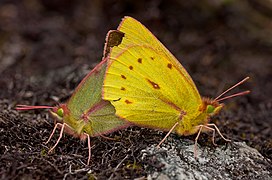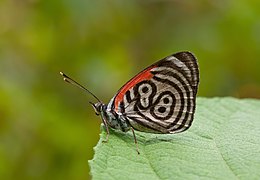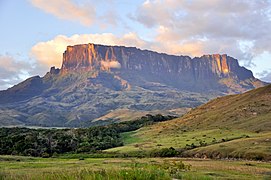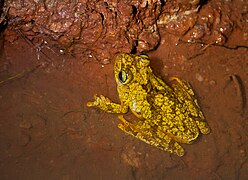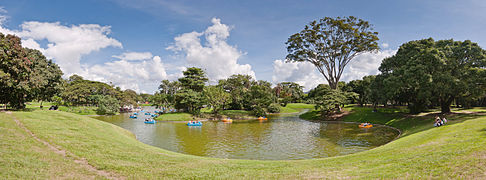Portal:Venezuela
The Venezuela Portal Venezuela, officially the Bolivarian Republic of Venezuela, is a country on the northern coast of South America, consisting of a continental landmass and many islands and islets in the Caribbean Sea. Venezuela comprises an area of 916,445 km2 (353,841 sq mi), and its population was estimated at 29 million in 2022. The capital and largest urban agglomeration is the city of Caracas. The continental territory is bordered on the north by the Caribbean Sea and the Atlantic Ocean, on the west by Colombia, Brazil on the south, Trinidad and Tobago to the north-east and on the east by Guyana. Venezuela is a presidential republic consisting of 23 states, the Capital District and federal dependencies covering Venezuela's offshore islands. Venezuela is among the most urbanized countries in Latin America; the vast majority of Venezuelans live in the cities of the north and in the capital. Venezuela is a developing country having the world's largest known oil reserves and has been one of the world's leading exporters of oil. Previously, the country was an underdeveloped exporter of agricultural commodities such as coffee and cocoa, but oil quickly came to dominate exports and government revenues. The excesses and poor policies of the incumbent government led to the collapse of Venezuela's entire economy. The country struggles with record hyperinflation, shortages of basic goods, unemployment, poverty, disease, high child mortality, malnutrition, severe crime and corruption. These factors have precipitated the Venezuelan refugee crisis where more than seven million people have fled the country. By 2017, Venezuela was declared to be in default regarding debt payments by credit rating agencies. The crisis in Venezuela has contributed to a rapidly deteriorating human rights situation. Venezuela is a charter member of the United Nations (UN), Organization of American States (OAS), Union of South American Nations (UNASUR), Bolivarian Alliance for the Peoples of Our America (ALBA), Mercosur, Latin American Integration Association (LAIA) and Organization of Ibero-American States (OEI). (Full article...) Selected article - Nationwide recurring electrical blackouts in Venezuela began in March 2019. Experts and state-run Corpoelec (Corporación Eléctrica Nacional) sources attribute the electricity shortages to lack of maintenance and to a lack of technical expertise in the country resulting from a brain drain; Nicolás Maduro's administration attributes them to sabotage. Since March, various nationwide blackouts occurred in the country. The first widespread blackout began on 7 March 2019 at 4:56 pm local time (GMT-4); it lasted through 14 March, when power was restored to much of the country. It was the largest power outage in the country's history, and affected the electricity sector in Venezuela in most of its 23 states, as well as Roraima border state of Brazil, causing serious problems in hospitals and clinics, industry, transport and in water service. At least 43 deaths resulted. On 12 March, power returned to some parts of the country, but Caracas remained only partially powered and western regions near the border with Colombia remained dark. Power outages persisted in some areas for many days after 14 March. (Full article...)Selected picture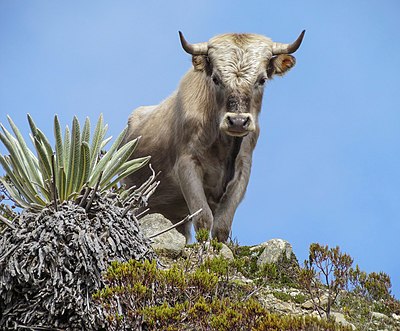
This is a feral Charolais cattle in the Venezuelan Sierra Nevada. The Charolais is a French breed of taurine beef cattle. It originates in, and is named for, the Charolais area of eastern France. Charolais are raised for meat; they may be crossed with other breeds, including Angus and Hereford cattle.
Selected biography - In this month...
Did you know (auto-generated) -
Selected list -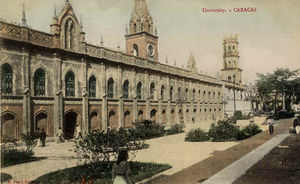 Venezuela has a wide array of universities, offering courses in a broad variety of subjects, spread between a total 23 public and 24 private universities located across several states. As a result of a Royal Decree signed by Philip V of Spain, the Central University of Venezuela—the country's oldest—was founded in 1721 as "Universidad Real y Pontificia de Caracas". The campus was originally at the now-known "Palacio de las Academias" but, in 1944, president Isaías Medina Angarita relocated it to the University City of Caracas. The second oldest university is the University of the Andes. Established in 1810 as the "Real Universidad de San Buenaventura de Mérida de los Caballeros", its origins date back to 1785 when Fray Juan Ramos de Lora founded a priest school in the city of Mérida. The University of Zulia—the third-oldest university—was founded in 1891 when the Federal College of Maracaibo was converted into a university. The government ordered the closure of the university for political reasons in 1904, and it remained closed until 1946. The University of Carabobo is the last to be founded before the twentieth century by being established in 1892 and dating back to 1833 when the College of Carabobo was created by presidential decree. (Full article...)Current events
More did you know...
TopicsCategoriesRecognized content
Featured articlesGood articles
Featured pictures
New articlesThis list was generated from these rules. Questions and feedback are always welcome! The search is being run daily with the most recent ~14 days of results. Note: Some articles may not be relevant to this project.
Rules | Match log | Results page (for watching) | Last updated: 2024-04-23 22:38 (UTC) Note: The list display can now be customized by each user. See List display personalization for details.
Things you can doWikiProjects
Related portalsAssociated WikimediaThe following Wikimedia Foundation sister projects provide more on this subject:
Discover Wikipedia using portals |





